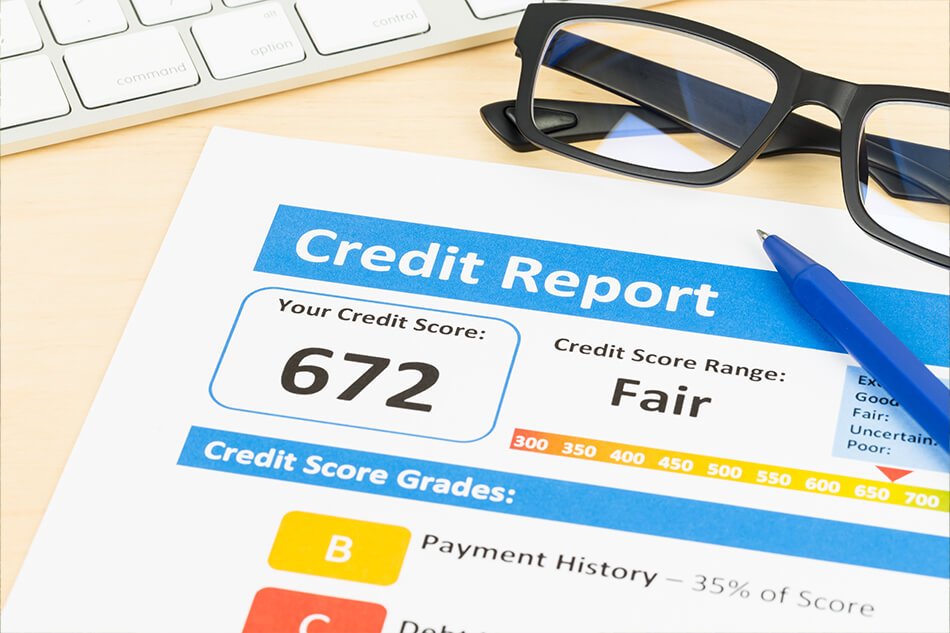Throughout the process of searching for a house and home loan, we repeatedly hear the words “good credit score” thrown around. But what is a credit score? And how do you know what yours is? How do you improve it? It’s one more example of confusing jargon in an already stressful process.
Read on to find out everything you need to know about credit scores. We’ll address all your concerns, explaining how credit scores work and how they impact your chances of getting a mortgage.
What Is a Credit Score?
Credit scores seem to be a magic number that informs the lender whether they should accept your loan application. Yet, they are slightly more complicated than this, and they’re certainly not magic. A credit score is a number between 1 and 1000 (or 1200 with different agencies) that represents your repayment history and tells the potential lenders how likely you are to repay your loan.
Based on your credit history, the credit score takes into account the following:
- The number of open accounts
- Total levels of debt
- Repayment history
Your credit rating will vary from month to month, depending on your financial situation and actions. For example, if a creditor rejects your mortgage application, it will dip (we’ll explain why later). Or, if you pay off your credit card debt, your score will increase. This is good news if you want to apply for a mortgage – your credit score isn’t set in stone.
Comprehensive Credit Reporting
In the past, credit reporting has typically focused on negative impacts. However, a newer system, called Comprehensive Credit Reporting (CCR), also considers positive actions. For instance, making monthly payments on time are taken into account. Plus, it includes additional details about the type and amount of credit and credit limits.
Under this new system, credit reports create a more accurate and comprehensive image of credit history. It may benefit those with a short credit history or low credit score. With more information available to credit providers, more people may see that their creditworthiness is valued better.
How do Credit Scores work?
Your credit score can significantly affect your life; primarily, playing a pivotal role in home loan lending decisions. Low credit scores are generally below 500, depending on the agency. The three major credit reporting agencies in Australia are Experian, Equifax, and Illion.
With a score lower than 500, lending financial institutions may charge higher interest rates to compensate for the additional risk.
On the other hand, a higher credit score may result in a lower interest rate. Therefore, you’ll pay less money throughout the loan’s lifetime. A high credit score is generally considered to be 650 or above. Scores above 800 are considered very good or excellent and may entitle applicants to the best loan terms and credit products.
While all lending institutions have their own terms of what they consider a good credit score, generally speaking, it falls within the following margins:
- Good: 600-699
- Very Good: 700-799
- Excellent: 800-1000
How Is Your Score Calculated?
While each credit reporting body calculates things slightly differently, they all look at roughly the same factors. To calculate a person’s credit score, they’ll take into account the following information:
- Payment history
- Total amount owed
- Length of credit history
- Types of credit
- New credit
Payment history and the total amount owed each account for about one-third of the scores. So, if you’re trying to improve your credit score, these are good areas to focus on. Payment history involves any missed payments, whether you pay bills on time and any bankruptcies on all your credit accounts.
The total amount owed considers the percentage being used of the credit available (called credit utilisation). For example, if you’re using 25% or less of your credit limit, your score may go up.
Your credit history accounts for around 15% of your credit score: the longer your record, the less risky. Longer credit histories offer more evidence of your reliability. Types of credit and new credit are around 10% of the score each. The former shows if you have a mix of different credits, e.g. car loan, mortgage, personal loan, and credit cards.
New accounts show how many accounts you have, accounts you have recently applied for that result in credit inquiries, and when you opened the most recent one.
What Is a Good Credit Score?
It’s important to remember that your credit score isn’t the only factor a potential lender will consider when deciding whether to lend money. Your credit risk also depends on your employment history and deposit. That said, improving your credit health will certainly help your home loan application.
As we mentioned, a good credit score is above 600. Very good score ranges would be in the region of 700-1000.
You can access your free credit report yourself by approaching one of the three credit bureaus. If you have a lower credit score, this doesn’t mean that you’re out of the running to apply for a home loan. With the help of a mortgage broker, you can find lenders that specialise in bad credit scores.
What Can Negatively Affect Your Credit Score?
If you’re trying to practice good credit behaviour, it’s essential to know what will negatively impact your score and avoid it.
Missing Payments
As we established, your payment history accounts for a significant part of how your credit score is calculated. While a missed or late payment here or there might not seem like a big deal at the time, it can stay on your credit file for several years. Lenders look unfavourably on applicants with missed payments as it might suggest unreliability.
Black Marks
Any behaviour considered harmful by your credit provider is called “black marks”. They’ll stay on your credit score for five up to seven years, significantly affecting future credit applications. Black marks include bankruptcy, court actions, defaulting on payments, debts with debt collectors, or credit infringement.
The only way to remove black marks is if they are incorrect. If they are accurate, you simply have to wait until enough time has passed before they disappear from the credit report. In the meantime, ensure that you pay off your debts and exhibit good credit behaviour to improve your score.
Too Many Applications
Each time you apply for credit, all inquiries are recorded on your credit report for up to five years. If there are too many inquiries in a short period, it could suggest to a future credit provider that you’re regularly denied credit and in poor financial health.
That’s why it’s crucial when you apply for your mortgage to ensure they only make soft inquiries at first. If any lender tries to make a hard inquiry in the initial stages of your application and then reject you, it could negatively affect your credit score.
How to Improve Your Credit Score
So, you want to improve your credit score. Unfortunately, it always seems that credit scores go down far more quickly than they go up. However, there are a few things that you can do to ensure that your score remains stable, if not improve it.
- Pay your bills on time – within six months of timely payments, you’ll see a noticeable difference in your score. Set up direct debits, manage a budget, and let your creditors know ahead of time if you think you’re unable to make a payment.
- Up your credit line – call your credit card companies and ask about increasing your credit limit. If you’re in good financial shape, you should be able to improve your credit amount. However, you mustn’t spend the additional available credit. The aim is to lower your credit utilisation rate.
- Don’t close any credit card accounts – while it might seem sensible to close unused accounts, it can do more harm than good. If you close an account that has a $2,000 limit with only $500 debt, then keeping it open but unused will improve your credit utilisation if you have other accounts with $1,500 debt on the same limit.
- Check for any inaccuracies – run through your credit report thoroughly to ensure that all the information is accurate. Look at reports from all three credit bureaus. If you see something that doesn’t look right, get in touch with your creditors or the credit report agency.
- Keep credit inquiries to a minimum – to ensure that hard credit inquiries don’t negatively impact your score, thoroughly research each credit application. Make sure that you’re eligible and ready to apply before going ahead.
- Do nothing – while this may seem counterintuitive, doing nothing can actually help your credit score. If you’re in relatively good financial health, then doing anything that may jeopardise your credit score is risky. The longer you have a great credit score, the more likely lenders will trust your reliability.
What Are the Benefits of Having a Good Credit Score?
A good credit score is important for several reasons. You’ll improve your chances of securing your home loan. While a good score isn’t a guarantee that your application will be approved, it will put you in a good position. However, it’s worth remembering that credit scores aren’t the only factors considered in the loan approval process.
Yet, with a good score, you’ll have a more substantial chance of getting low-interest rates and other loan features. You’ll be in a better position to negotiate your loan terms with the lender and save yourself money in the long run.
Finally, a good credit score will set you up to achieve your life goals. Whether you’re saving for a house, renovation, holiday, wedding, or whatever it may be, a good score will provide more flexibility. As a general indicator of your financial health, you’ll likely have the initial funds to afford larger payments. Plus, it’ll help negotiate personal loans and credit should you need to.
Get the latest news and updates from Lendstreet
Join and subscribe to our newsletter.
Bottom Line
A high credit score isn’t the be-all and end-all of applying for a mortgage. While a healthy score will definitely help your application, don’t worry yourself excessively by reaching that magic number. Many lenders still negotiate with those that have poorer scores. And, with the help of a mortgage broker, you can ensure that you only apply for credit products that you’re eligible for.
It’s worth remembering that there are certain behaviours you should adopt. Not just to improve your score, but to overall improve your financial health. Avoiding missed or late payments and black marks will go a long way to helping your financial situation and credit score.
Schedule a call to one of our expert mortgage broker
Ask our expert mortgage brokers anything about home loans.
Related articles
In Australia, the official cash rate and the interest rates on loans and bank accounts are two different things. ...
If you're a property investor looking to secure your next loan, you must consider all your options. Choosing between ...
Key Takeaways: A credit score is designed to predict your financial behaviour and helps a credit provider assess risks. ...









